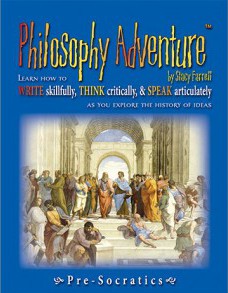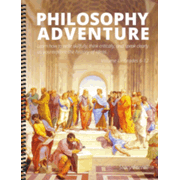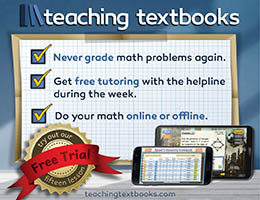Philosophy Adventure ™ by Stacy Farrell can expand to serve as a unit study for a full year or contract for use in only one quarter of your school year for students in grades six through twelve. It might provide up to two full credits for high school—up to one-half credit each for English Composition, World History/Geography, Speech, and Logic/Critical Thinking. The course can be used to prepare students for speech competitions.
Pre-Socratics is the first course in what should eventually be a series of four courses, but it is the only course available thus far. Pre-Socratics can easily stand alone even if you don't continue with other Philosophy Adventure courses. So don't think you need to wait until subsequent courses are available.
The main components of the Pre-Socratics course are the Reader, the Student Workbook, and the Teacher Resources. (Valuable bonus resources are also available to those who register their purchase.) You can expand the course with three more resources authored by Stacy Farrell that are designed to work alongside Philosophy Adventure Pre-Socratics lessons: Philippians in 28 Weeks, The Wise Woman with Literary Analysis Journal Questions, and Mere Christianity Critical Analysis Journal.
As you probably surmised from the series title, the courses are about philosophy, and Pre-Socratics introduces the series with a study of eight ancient philosophers from before the time of Socrates. Students learn about each philosopher and his ideas, all within the context of a Christian worldview.
There is an explanation of how the course works at the beginning of the Reader, but I found the bonus resources even more helpful for getting an overview of how the various components of the course work. The bonus resources have “Lesson at a Glance” one-page lists of “Student Actions Steps” for each lesson. Lesson Plans have full page charts for each week showing daily assignments from all of the course resources. Lesson Plans have space for notations as well as check-off boxes, so the Lesson Plan pages can become your record keeping pages.
Lessons in the text are laid out consistently from lesson to lesson so that they are easy to follow once students grasp the progression. Colorful graphic designs are used to delineate different parts of the lesson which turns out to be very helpful since Farrell uses an interesting and unusual layout. Every lesson in the Reader has the same seven components. The story of the philosopher takes up four pages of each lesson, but the story begins on page one of the lesson and continues on pages two, four, and six. Pages three, five, and seven feature “Write,” “Think,” and “Speak” articles and assignments. The eighth lesson page, titled “Explore His World,” has a map of where the philosopher lived plus photos or images and some geographical information. The ninth lesson page explains the school of thought with which the philosopher is associated. The concluding page of each lesson, “Contrast,” is split into two parts. The first part has quotes by or about the philosopher representing some of his significant ideas. The second part compares and contrasts those ideas to a biblical worldview.
At the back of the book are a series of checklists for writing assignments, a creative writing assignment for each lesson, an index, and a recommended resources list. The various checklists cover pre-writing, the substance of the paper, structure, style, and polish. There are also peer critique and evaluation forms.
For the creative writing assignments, Farrell uses an idea or concept drawn from the philosopher's story as a jumping off point. Then she presents an assignment with a number of writing prompts to make it easy for students to quickly start writing. Students should spend only 15 minutes on each of these. These same pages are reproduced in the student workbook with room on the reverse side for students to do their writing. (Note that the writing prompts are quite similar to those in Farrell's separate book Creative Freewriting Adventure. Students do not need that book if they are working in Pre-Socratics, but students not using Pre-Socratics can use Creative Freewriting Adventure on its own.)
The 152-page Student Workbook has pages on each philosopher where students will write paragraph-length answers to a series of questions that help students recall key information from the lesson. Mapping assignments follow the questions. Students label key locations on a map, then they write facts about each location on a chart using information from the Reader. Journaling pages follow next with space to write answers to questions posed in the reader such “Why is there evil, suffering, and death?” and “Is there hope for my future?” (from the first lesson), and “Can you think of a time when you took a risk and tried something new…and it didn't go well. Write about it.” (from lesson 6). Checklists found in the Reader are reproduced again in the Student Workbook. The workbook ends with 20 glossary pages for students to create their own glossary. Glossary words are entered in charts in alphabetical order with a reference as to the lesson and page in the reader where each appears. The charts have space for students to write their own definitions.
Both the Reader and the Student Workbook are available in either print or digital editions. The digital Reader really needs to be printed in color if you choose to print it, so consider this when selecting which version to buy. Workbooks are black and white, so black-and-white printing works fine.
Teacher Resources—whether on a CD or as a digital download—include memory cards, quizzes, answer keys to quizzes and student mapwork pages (in the student workbook), and timeline resources. (A glossary "answer key" is included in the bonus resources.) The eight memory cards for each philosopher plus 16 “Think” cards help students review key information, but these need to copied (double-sided) on card stock and cut apart. Quiz questions are identical to information on the memory cards. Many quiz questions are also identical to those on the student workbook pages, so the course uses multiple methods to repeat the same information to ensure that students master it.
Critical thinking is integrated throughout the course. Students wrestle with the ideas of the various philosophers, analyzing them and comparing them to Christian beliefs. You might even consider this an introductory logic course.
The amount of composition work is also significant as students write journal entries, responses to questions on notebook pages, essays, speeches, and creative writing.
Companion Resources
The three companion items that expand the Pre-Socratics course can all be used on their own aside from the course. However, they were each designed to serve a strategic purpose in conjunction with Philosophy Adventure: Pre-Socratics. Farrell explains: “The time invested in pondering and memorizing the Word of God using Philippians in 28 Weeks provides a powerful counterbalance to man-made theology (or the outright denial of God).” The study of Mere Christianity demonstrates that some of the important questions asked by early philosophers still puzzle great minds today. However, C.S. Lewis demonstrates the power of Christianity to provide ultimate answers to many of those questions. Finally, The Wise Woman with Literary Analysis Journal Questions, use George MacDonald's classic fable to counter the temptation to pride that often crops up when students study philosophy and logic. (Bonus Material, Introduction).
Philippians in 28 Weeks
Philippians in 28 Weeks is a resource for memorizing the entire book of Philippians that incorporates a number of tools to ensure success. Reading the entire book of Philippians every day is the first strategy. Next is copywork, writing out the book verse by verse on space provided in the book. You can select Philippians in 28 Weeks in either the KJV or ESV. The selected version is used throughout the book, so be sure to choose your preferred version. Every few verses are accompanied by reflection questions so that the student ponders the ideas and considers what they mean in his or her life. Space for students to write weekly observation and comments helps in this regard as well. The entire book of Philippians is reproduced at the back of the book for easy reference. At the back you will also find record keeping charts and four pages with the memory cards printed on heavy card stock and perforated for easy separation. The memory cards in the preprinted version might be sufficient reason to purchase the printed book rather than a digital download.
Mere Christianity Critical Analysis Journal
This 162-page book is a study guide to be used alongside a copy of Mere Christianity which you will need to obtain separately or as part of a bundle from Home School Adventure Co. Publications. While the guide is available in either print or digital editions, be aware that students can type directly into the digital edition.
Farrell presents thoughtful questions for students to ponder as they read through Mere Christianity chapter by chapter. While some questions are at the comprehension level, most require analysis and personal application.
The Wise Woman with Literary Analysis Journal Questions
The Wise Woman with Literary Analysis Journal Questions includes the text of this classic book by George MacDonald as well as Farrell's analytical questions. As with so many of MacDonald's work, there are significant spiritual analogies in this story. As Farrell explains, “The Wise Woman enchants readers while it contrasts the ugliness of pride, selfishness and conceit with the beauty of humility, sacrifice, and compassion” (http://homeschooladventure.com/shop/wise-woman-literary-analysis-journal-questions/). Even though MacDonald tells the story of a woman, his fable is full of adventure. As with other fables, it should appeal to both male and female readers. Similarly, questions in the study guide are gender neutral.
At the back of the study guide are pages for students to create their own glossary, just as in the Philosophy Adventure: Pre-Socratics Student Workbook.
Summary
The Philosophy Adventure: Pre-Socratics course makes the study of philosophy very accessible, even to students as young as sixth grade. Clear, simple explanations and repetition through the various activities help students to recall what they have learned. The worldview component provides the balance so often lacking in other philosophy courses. The option of using the three additional resources provides even more support for a Christian worldview as well as spiritual and character development.
Students can work independently through all of the resources, although they will need an audience for their speeches and written work. While parents and family are sufficient, a weekly group class is probably the ideal setting for the Philosophy Adventure.
Farrell has clearly spent many years developing and presenting this course material to be able to present such a comprehensive presentation. I can't wait to see what she does with Plato and Aristotle!












